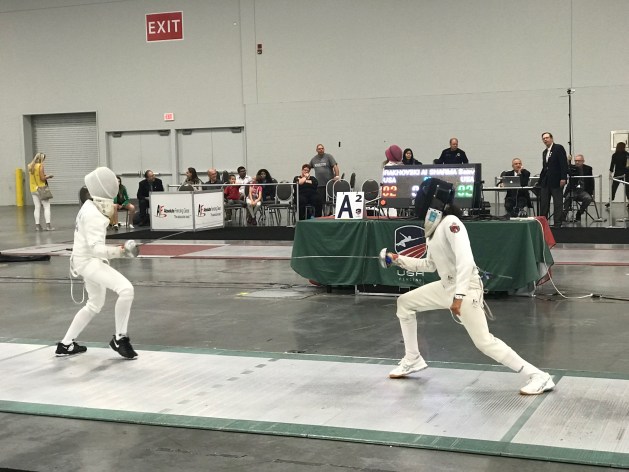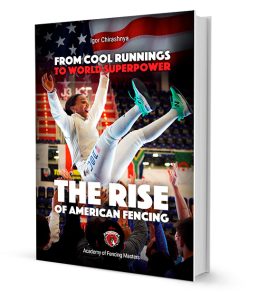
Competing early and competing often is invaluable. Why? Because fencing is a skill that’s developed over time.
The Y10 is the youngest age category that competes at the national level. There is a burgeoning Y8 category, but it’s not yet part of the national or regional level. Y10 is as low as we go, and there’s a lot of reasoning behind getting these youngest fencers up on the national stage.
Fun & childhood development
There is so much behind how a child develops. What we don’t want is to stifle that development with heaps of extra pressure. Competing in fencing at the national level doesn’t necessarily mean putting lots of pressure. In fact, it can be the exact opposite if we support it in the right direction.
Y10 fencers range in age from eight to eleven years old, for this 2021-2022 fencing season these are the kids that were born 2011-2014. They’re still in elementary school, and at first glance, it can seem as though these young fencers are in fact too young to be put on such a big stage. They are very much still kids.
Allowing them to still be kids can mean allowing them to explore the world around them. Fencing at Y10 national events is certainly about accomplishment, but that’s not the driving force here. The driving force here is exposure to a wider world.
Here’s the thing – at this age, these kids are wide open. Tweens and children still have a wonderful wide-eyed innocence in which they are still exploring the world in a big way. They’re little sponges that soak everything up without judgment or cynicism. As kids get older and become teenagers, they have a lot more competition for their attention. They also have a lot of development going on, both mentally and physically, thanks to puberty.
In the Y10 category, they are very much still fencing for fun. That’s one of the reasons we want to see them compete at this level. When they compete at the national level at this age, they have this wonderful opportunity to become comfortable here AND to still have fun with it. When parents and fencing coaches come at this competition from this angle, it can be hugely beneficial.
Enjoying the moment while thinking ahead
As parents, it’s our responsibility to think about the future of our children as well as to enrich their present. It’s a tight rope that we walk across.
Fencing should be fun at any age, and especially at this age, but we must also look at it through the lens of giving these young fencers a leap forward for their future. Not just in terms of their long-term fencing career, but also in terms of their immediate enjoyment. We want to see them soak up the moment.
Y10 fencing at the national level is a bold experience for a child to have. There’s the travel, but there are also the friendships and the family bonding. There are the lessons in goal setting, but there are also the lessons in working cooperatively with a mentor. All of these things allow younger fencers to enjoy the moment, just like kids should be doing, but they also lay the groundwork for them to be successful later in life.
High flyers start young
Mariel Zagunis. Gerek Meinhart. Nick Itkin. Alexander Massialas.
What do all of these top United States fencing Olympic medalists have in common? They all started fencing when they were young. They all were Y10 competitors.
It takes about five to seven years for a fencer to grow into their full potential. That’s five to seven years of regular training and hard work. Good days and bad days, setting goals and working with a coach to improve. It’s a personal journey that every fencer goes through in their own way, but it’s also something that we’ve done enough to know the patterns.
In the United States, the peak of most fencers is around 10th grade to 12th grade. These fencers are at the Cadet/Junior level, and it’s where they go onto that track to be elite or to venture into other things. Our system is structured around the NCAA and college fencing, so we need to see fencers channeling towards that path. [I am not talking here about whether it is good or bad, but only stating the de facto reality with youth fencing in the country]
There are only two events each year for Youth fencers on the national level. Yes, only two! That means there are not as many opportunities to really learn what they need to know to compete on this level. It takes several big national events for kids to get comfortable. There are simply the logistics of the whole operation. It’s a big, bold thing to go to one of these large tournaments! Simply adjusting to what the format of the event is and getting comfortable with the scale is essential to success.
With older kids, starting with Y14, there are many more opportunities for national competitions. Once a child crosses into a teenager, they’ve got their pick of places and events. When they get to that level, it’s great for them to already have experience because they don’t lose time adjusting.
Having a kid start fencing nationally at the age of nine or ten is a great investment in their ability to learn fencing. They might go on to be Olympians one day like the greats, and they might not. Either way, they will definitely learn a lot of lessons and grow through their fencing if they are given the opportunity. That’s not to say that champions don’t start competing nationally later sometimes, but starting early is absolutely the way that many champions get there.
The same patterns
In my club, I see the same pattern repeat itself over and over again. Most of the kids who perform well in the Cadet/Junior level start getting national experience in Y10. From there, they continuously refine their art by competing on the national scene.
When a fencer starts out young, they learn to not be intimidated by the national level. All of those nerves fall away and they are able to just enjoy the fencing. That doesn’t mean they don’t ever have nerves or that they don’t feel the pressure, but it is absolutely easier for them to find the joy. As well as for their parents to have less stress from their child’s performance. When a fencer is able to find joy in fencing, they are able to find the flow in their fencing and they perform better.
It’s not just my fencers that I see this pattern in, though. I see their opponents year after year, and these are the same girls and boys who have been coming out to fence since Y10. When they meet each other on the strip, not only are these young fencers not intimidated by these new “strong” kid fencers, they also know them well in most cases. Kids who compete against each other on the regional and national level multiple times a year for several years connect with one another. They often become friends and hang out together on these trips, learning from each other and expanding their social circle.
We see this pattern so many times that it’s impossible to ignore. The level of comfort is so high that they are able to focus better in competition and to perform well. Again, it’s as much about the joy of doing this sport as it is about the accomplishment of competing on this level.
Benefits of Y10 national competition
There are some strong benefits for fencers who compete on the national level at this age.
Developing passion
The central benefit of competing on the national level is that young fencers develop a passion for something. There is a love of the sport that comes with devoting this amount of time to training, in part because they are surrounded by people who are so incredibly passionate about it. Passion is contagious.
Goal setting
Kids don’t learn skills unless we take the time to teach them those skills. Planning for a goal, then executing the steps to reach it is hugely valuable for younger kids. They learn how to decide what it is they want to do, then create a plan of action to get there.
Admittedly, at the Y10 level it is necessarily the parents who are driving the planning. That means parent/kid bonding time, which is always a good thing. Sitting down together to plan out the season is a way for kids and parents to come together and figure out what works best for them. The best part is when you get to the end of the season and kids can look back and see the progress that they’ve made! It’s a wonderful, eye-opening experience for a child to look back at the growth that they have made in a year. And this family bonding grows deeper with the time, and parents really appreciate it when their kids reach their teenage years
Physical fitness
To get to the national level, Y10 fencers have to commit to physical fitness. This is the age where they develop habits that will carry them through for the rest of their lives. Training consistently pushes kids to increase their level of fitness in a positive way.
Training camps are definitely part of this. Fencers who compete at the national level end up attending weeklong camps to prepare for competition. These are fun and exciting, but they are also highly physically demanding. This all raises the level at which young fencers engage with their bodies.
Training with others
Socialization is so incredibly important for kids. They need to be around others so that they can learn how to navigate all kinds of relationships. One of the great things about training for this level of competition is that young fencers build bonds with their peers in class, but also across ages. Y10 fencers range in age from eight to eleven, so roughly third grade to roughly sixth grade. In school, kids don’t often come across mixed-aged groups. The same is true for lots of sports.
By competing in the Y10 division, they learn to interact with kids who are slightly outside of their normal interaction. That’s not even mentioning the coaches and the older fencers who act as mentors for Y10 competitive fencers at this level. It’s truly an enriching experience.
Becoming independent
As much as possible, kids at the Y10 level learn skills revolving around independence. They have to in order to get this far. Fencing classes, preparation camps, and even competitions have an element of stepping away from the apron strings to them.
When a kid steps up onto the strip to face their opponent, it’s only them there. Mom and dad can’t come in and do this for them – they have to do it on their own. This is one reason it’s such a mark of pride and personal development for a Y10 fencer to progress to the national level. They have to have gotten there on their own!
Meaningful time
Every parent that I know is concerned about how kids spend their time, particularly when it comes to screen time. Fencing is by definition time away from the screen, and it’s time that kids don’t miss.
It’s important to think about not just pulling back on the screens, but also about filling that time with something meaningful. When a nine year old gets excited about going to a competition, they aren’t tempted as much by the lure of digital devices.
Building confidence
Going into the teen years, it’s incredibly important that young people have a strong sense of self confidence. It’s a part of the self that’s challenged for everyone through adolescence. We want to build that self esteem as much as we can when they are young so that they can weather the storms of the teenage years without getting knocked back.
The mental health benefits of competitive fencing are valuable for teenagers, but giving them a head start when they are younger is a buffer for when they get older.
Reaching potential
Kids will rise to the stimuli that we give them. It’s one of the really wonderful things about being a parent. We can see this in little tiny kids who take their cues from their parents. If I take a taste of those mashed peas and smile, my little one is more likely to eat a mouthful. By that same token, if I as a parent am unfazed by the national competitive level and make it just a part of normal life, then my ten-year-old will not be so intimidated by it either.
All of this must be predicated on progress over podium finishes. Though we as parents want the best for our children, what we really want is for them to become independent of us eventually. Y10 national competitions give kids the chance to move the mountain on their own, as long as mom or dad are there to support them and cheer them on. It’s a means of growth for everyone involved.
We want our kids to achieve, not because it’s a marker of their value, but because it is exemplary of their potential. Encouraging high levels of competition is an all-around wonderful boost for the youngest fencers, both now and for the future.




0 Comments